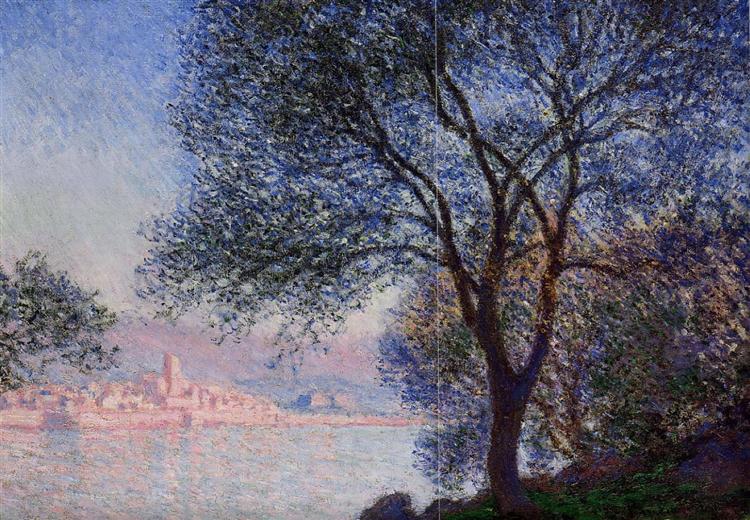Beskrivelse
Claude Monet's painting "Antibes Seen from the Gardens of Salis 02", created in 1888, is a work that encapsulates the spirit of Impressionism, an artistic movement that Monet helped define and popularize. This work is set against the backdrop of the numerous landscapes the artist painted during his stay in the Côte d'Azur province, where he sought to escape the stresses of urban life and explore the beauty of the natural environment.
Looking at the painting, one cannot help but be captivated by the luminosity and vibrant range of colours that Monet employed. The scene is characterised by a radiant, blue sky reflected in the water of the Mediterranean, creating a visual dialogue between the painting and nature. The composition is divided between the vegetation that frames the foreground – dominated by light greens and yellows that suggest typical Mediterranean flora – and the coastal landscape of Antibes that unfolds in the background. This layered structure not only gives depth to the work, but also invites the viewer to enter into the scene itself.
Another notable aspect is the way Monet captures light. The play of light and shadow results in soft color transitions that suggest the effect of natural light on the landscape. Reflections in the water seem to capture the various hues of the sky and vegetation, a characteristic trick of the Impressionist style that seeks to capture the ephemeral nature of light. This approach was part of Monet's innovative practice, as he constantly explored the relationship between light and color in his work.
As for the human figure, a notable feature of this work is the absence of prominent figures in the composition. This can be interpreted as a reflection of Monet's view of the landscape as a space for contemplation, rather than a stage for human activity. This emphasis on nature and the environment suggests a desire to connect with the natural world on a deeper level, something that resonates in many of his other works from this period.
Throughout his career, Monet experimented with depicting the same subject on multiple occasions. It ranges from his famous Water Lilies series to his studies of Rouen Cathedral, where the change of light at different times of the day completely alters the perception of the landscape. In "Antibes Seen From The Gardens Of Salis 02", Monet applies this same principle, but within the context of a coastal landscape, suggesting that the transience and diversity of visual experience are constants in his work.
This painting can also be seen in connection with the broader trend of Impressionist artists in the 19th century who sought out and celebrated the beauty of the natural landscape. Monet's preference for coastal subjects, particularly in the south of France, highlights his dedication to exploring light and color in various atmospheric conditions. Although this specific work from 1888 is not one of his most renowned, its quality and technique align it perfectly with the evolution of Impressionism and Monet's continuing interest in capturing the essence of the world around him.
In short, "Antibes Seen from the Gardens of Salis 02" is a manifestation of Monet's ability to combine light, color and form in a way that invites us to share his wonder at the beauty of the everyday landscape. The work not only represents a place and a time, but also symbolizes the artistic quest of a master who, through the simplicity of sight, managed to move us with the complexity of perception.
KUADROS ©, a famous painting on your wall.
Hand-made oil painting reproductions, with the quality of professional artists and the distinctive seal of KUADROS ©.
Painting reproduction service with satisfaction guarantee. If you are not completely satisfied with the replica of your painting, we will refund 100% of your money.

